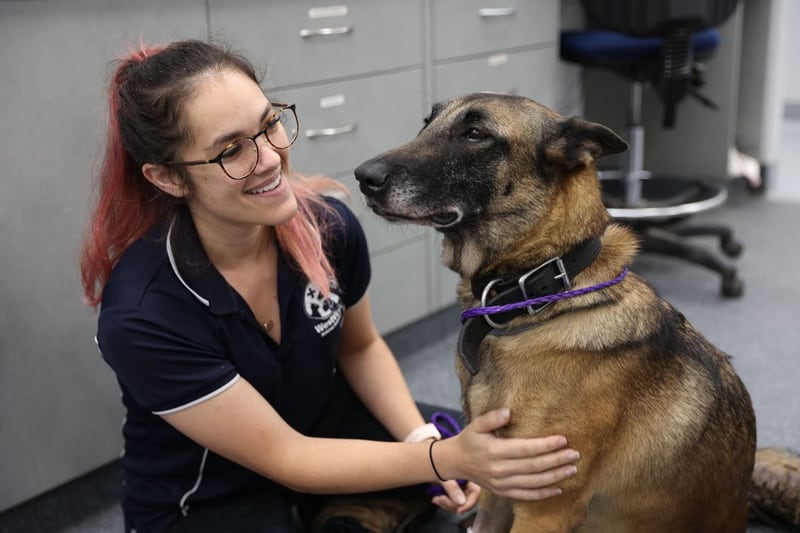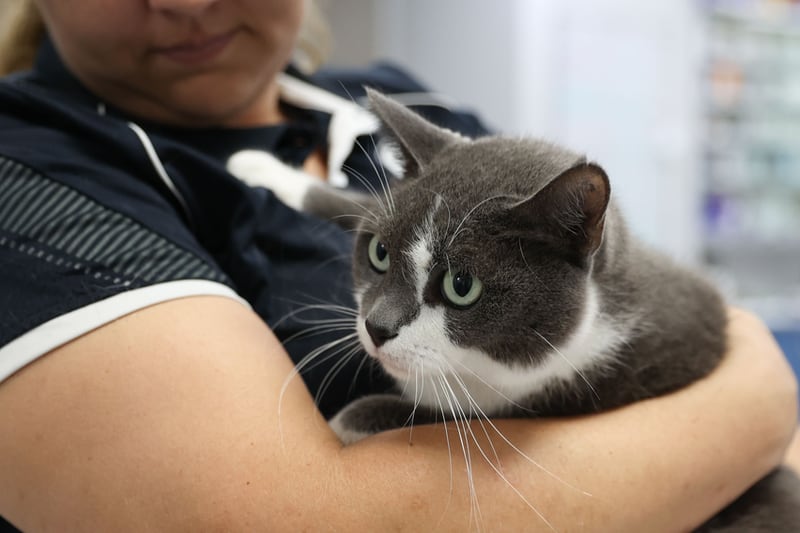Medicine
Geriatric Medicine for Pets
Geriatric services are specifically designed to cater to the unique needs of our ageing pets. As animals enter their senior years, they may experience age-related health issues and require specialised care. Our geriatric services focus on promoting the comfort, well-being, and overall quality of life for our senior pets.
Our veterinarians provide comprehensive geriatric assessments including physical examinations, blood work and diagnostic imaging to detect and manage age-related conditions such as arthritis, kidney disease, cognitive decline and dental problems. These services often include tailored nutritional plans and specialised diets, pain management strategies, mobility aids, regular monitoring to ensure that senior pets receive the support they need and other holistic treatments. Our veterinary team is trained to recognise signs of aged-related health problems and have experience in providing optimal care for older animals. Regular check-ups involve more frequent tests than those given to younger pets to monitor changes in your pet’s health.
Our veterinarians can also help to plan for end-of-life care when that time comes. Geriatric services play a crucial role in helping pet owners navigate the challengers of their pet’s aging process, providing them with valuable guidance and compassionate care to ensure that their senior pets enjoy their golden years to the fullest.
Tick Prevention for your pet
When it comes to ticks, prevention is always better than a cure. Today’s manufactures have made it super easy to keep your pet up-to-date with tick prevention which fits in with your lifestyle. However, in the event that your pet has been affected by a tick and is suffering from the following effects, we strongly advise that you seek immediate veterinary attention.
Signs of Tick Intoxication:
- A loss of coordination in the hind legs, they come wobbly or are not able to get up which may progress to paralysis
- A change in their voice/bark
- Vomiting, retching or coughing
- Loss of appetite
- Laboured or rapid breathing
- Lethargy
Upon your arrival, our experienced veterinarians and nurses will conduct a full physical examination and after consultation with you, will ensure your pet is stabilised, intravenous fluids commenced, blood samples taken, antinausea medication administered and, if needed, a urinary catheter placed as the paralysis will affect their ability to urinate.
In most cases, tick antiserum must be administered as this will reverse the effects of paralysis tick toxin. This, however, does not come without risk as some patients can experience an allergic reaction to the antiserum. Our staff will therefore closely monitor your pet during and post the administration process and will perform regular checks on their vital signs.
Before your pet is able to be discharged from hospital, we look for 4 markers of returning to normal neurological function:
- ability to urinate and defecate unaided
- ability to stand and walk unaided
- ability to eat food comfortably without choking
- ability to breathe comfortably and not require oxygen therapy
Recovering from a paralysis tick does take time, with patients typically being hospitalised for several days. However, once discharged, the care continues at home and you will be provided with a home care plan to ensure recovery goes smoothly.
Snake bite first aid for your pet
Snakes play a big part in living in South-East Queensland as the warmer climate is perfect for their cold-blooded bodies. You can lower your chance of encountering a snake by keeping the outside of your home clutter free, by keeping grass well maintained, ensuring pet food and water are not accessible to wildlife, enclosing compost heaps to reduce mouse population and tidying up aviaries as these attract mice which in turn attract snakes.
A snake bite is one of the most serious emergencies you or your pet may ever face. This situation is one we all dread and do our best to prevent, but sometimes even the best prevention is not enough. Therefore, knowing the immediate steps to take can increase the chances of saving your pet’s life.
Snake bite symptoms can include:
- Sudden weakness followed by collapse
- Shaking or twitching of the muscles and difficulty blinking
- Vomiting
- Loss of bladder and/or bowel control
- Dilated (wide) pupils
- Paralysis
- Blood in urine
Should you suspect your pet has been bitten by a snake, it is important to seek immediate veterinary care. The sooner the treatment is commenced, the greater the chances of survival.
First aid includes keeping your pet as calm and quiet as possible and if practical, applying a pressure bandage (a firm bandage of any material) over and around the bite site. NEVER apply a tourniquet, wash or cut the wound site. Carry your pet rather than let it walk to avoid speeding the spread of the snake venom. We do not recommend you attempt to capture/transport the snake to our clinic for identification purposes (even if it appears deceased) however a photograph on your mobile phone from a safe distance could be considered, if practical.
Again, if practical, we recommend you call our clinic to advise us of your impending arrival so that we can ensure our veterinarians and nursing staff are ready to take immediate action for your pet. Upon your arrival, we will conduct an examination to assess any clinical signs your pet is showing to determine the best course of action. Further diagnostic tests may be required to determine if your pet has actually been bitten by a snake and sometimes it is useful to identify the type of snake via a snake bite detection kit. Veterinary treatment varies with each individual case, how severe the symptoms are and how rapidly the symptoms progress. Treatment usually consists of intravenous fluids and the administration of antivenom to neutralise the snake venom with some patients requiring multiple vials. The type of antivenom given depends on the type of snake but if the snake is not seen or identified, the choice can be made on geographical location, snake detection kits or several antivenoms can be given. Hospitalisation will also be required to monitor your pet’s symptoms and to treat any complications that may arise.
Other supportive care may also be required including oxygen supplementation and even manual breathing for your pet if they are not able to breath well on their own. This needs to continue until the circulating venom has been neutralised and any bound venom has worn off.



